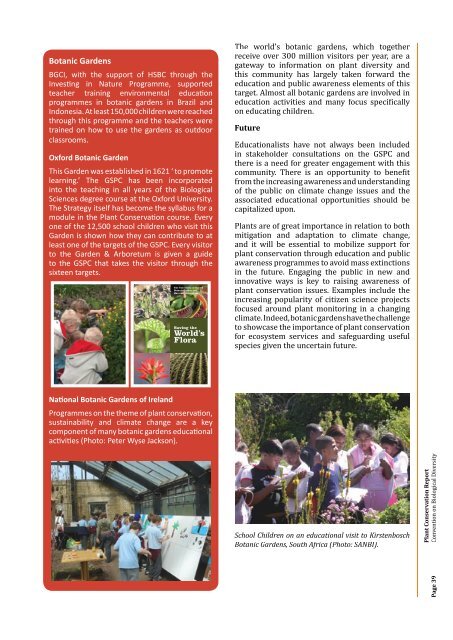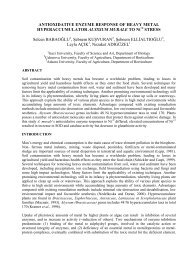from the global partnership for plant conservation
from the global partnership for plant conservation
from the global partnership for plant conservation
You also want an ePaper? Increase the reach of your titles
YUMPU automatically turns print PDFs into web optimized ePapers that Google loves.
Botanic GardensBGCI, with <strong>the</strong> support of HSBC through <strong>the</strong>Investing in Nature Programme, supportedteacher training environmental educationprogrammes in botanic gardens in Brazil andIndonesia. At least 150,000 children were reachedthrough this programme and <strong>the</strong> teachers weretrained on how to use <strong>the</strong> gardens as outdoorclassrooms.Ox<strong>for</strong>d Botanic GardenThis Garden was established in 1621 ‘ to promotelearning.’ The GSPC has been incorporatedinto <strong>the</strong> teaching in all years of <strong>the</strong> BiologicalSciences degree course at <strong>the</strong> Ox<strong>for</strong>d University.The Strategy itself has become <strong>the</strong> syllabus <strong>for</strong> amodule in <strong>the</strong> Plant Conservation course. Everyone of <strong>the</strong> 12,500 school children who visit thisGarden is shown how <strong>the</strong>y can contribute to atleast one of <strong>the</strong> targets of <strong>the</strong> GSPC. Every visitorto <strong>the</strong> Garden & Arboretum is given a guideto <strong>the</strong> GSPC that takes <strong>the</strong> visitor through <strong>the</strong>sixteen targets.The University of Ox<strong>for</strong>dBotanic Garden andHarcourt ArboretumSaving <strong>the</strong>World’sFloraThe world’s botanic gardens, which toge<strong>the</strong>rreceive over 300 million visitors per year, are agateway to in<strong>for</strong>mation on <strong>plant</strong> diversity andthis community has largely taken <strong>for</strong>ward <strong>the</strong>education and public awareness elements of thistarget. Almost all botanic gardens are involved ineducation activities and many focus speciicallyon educating children.FutureEducationalists have not always been includedin stakeholder consultations on <strong>the</strong> GSPC and<strong>the</strong>re is a need <strong>for</strong> greater engagement with thiscommunity. There is an opportunity to beneit<strong>from</strong> <strong>the</strong> increasing awareness and understandingof <strong>the</strong> public on climate change issues and <strong>the</strong>associated educational opportunities should becapitalized upon.Plants are of great importance in relation to bothmitigation and adaptation to climate change,and it will be essential to mobilize support <strong>for</strong><strong>plant</strong> <strong>conservation</strong> through education and publicawareness programmes to avoid mass extinctionsin <strong>the</strong> future. Engaging <strong>the</strong> public in new andinnovative ways is key to raising awareness of<strong>plant</strong> <strong>conservation</strong> issues. Examples include <strong>the</strong>increasing popularity of citizen science projectsfocused around <strong>plant</strong> monitoring in a changingclimate. Indeed, botanic gardens have <strong>the</strong> challengeto showcase <strong>the</strong> importance of <strong>plant</strong> <strong>conservation</strong><strong>for</strong> ecosystem services and safeguarding usefulspecies given <strong>the</strong> uncertain future.National Botanic Gardens of IrelandProgrammes on <strong>the</strong> <strong>the</strong>me of <strong>plant</strong> <strong>conservation</strong>,sustainability and climate change are a keycomponent of many botanic gardens educationalactivities (Photo: Peter Wyse Jackson).School Children on an educational visit to KirstenboschBotanic Gardens, South Africa (Photo: SANBI).Plant Conservation ReportPage 39 Convention on Biological Diversity
















